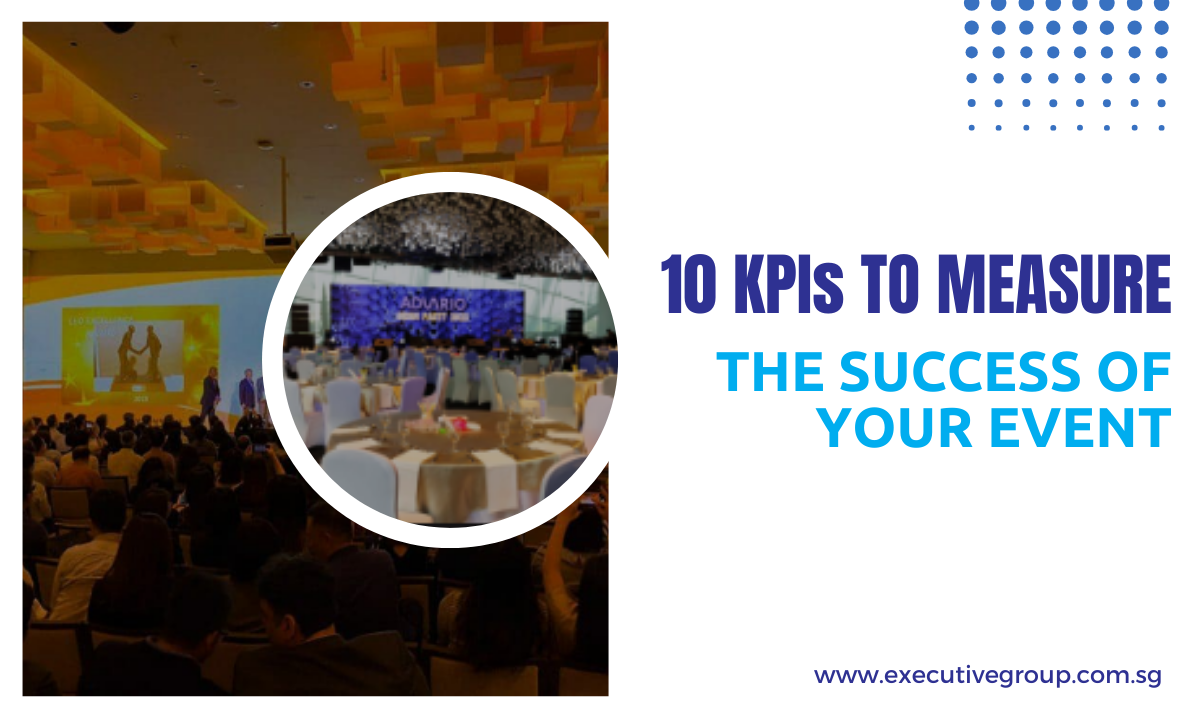
10 KPIs to Measure The Success of Your Event
Organising and managing events can be expensive and labour intensive, so measuring its success is just as critical as the planning and execution phases. The first step is to accurately assess what has worked and what didn’t for past events to improve on future ones, and this is where KPIs (Key Performance Indicators) come into action.
KPIs are useful tools that measure performance in various areas, offering specific data to make your event assessments more meaningful and objective. Let’s explore the field of event analytics and identify several important KPIs that reveal the actual indicator of how successful your event will be.
From financial and attendee engagement KPIs to operational and environmental ones, read on to find out more about how these metrics which cover a wide range of aspects, can transform . your events to become more successful and impactful than ever before.
Event KPIs: What are These?
Event key performance indicators (KPIs) are an ideal way to track and measure the success rate of your event. It enables you to check how certain aspects such as attendee satisfaction scores, audience numbers, ticket sales, social media engagement, revenue generated, and pre & post-event surveys influence the success of your event. These indicators confer insight into the event’s effectiveness in achieving its goals consisting of live lead generation, brand awareness, or customer retention. When it comes to making your event successful, it is vital to keep track of these KPIs as it helps you focus on specific areas that require improvement and in turn enable you to fine tune your strategy for upcoming events.
How Effective are KPIs in Measuring Your Event’s Success?
Hosting an event can be an adrenalin rush but understanding the success of your event plays an indispensable role in your overall strategy and future planning. Let’s examine some crucial KPIs to determine your event’s performance:
Attendance Rate
It’s important to consider how many guests you are inviting to attend your event as their presence is a fundamental indicator of its success. Therefore, keeping track of registrations and actual attendance to gauge interest and participation levels is idea must.
Speaker Engagement Rate
The speaker engagement rate tells the organising committee how engaged the audience is and whether they are keeping up with the information presented at hand. For both in-person and virtual events, live polls are the most practical way to measure involvement rate. These polls can be conducted immediately after a guest speaker presents to find out whether the attendees are genuinely interested in the content or if the programme line-up is simply not their cup of tea. Additionally, establishing a culture of communication between businesses and consumers is an excellent approach to cultivating relationships.
Lead Generation and Conversion
For business-oriented events, lead generation and conversion are crucial. At this point, keep a track record of the number of leads generated during the event and also measure their progression through the sales funnel post-event which will help you to understand the actual success of your corporate event.
Social Media Reach and Engagement
It’s very rare in today’s modern age to find anyone without any social media presence, therefore there is no other platform with that level of reach to measure the success of your event. It is important to monitor analytics on your event across various social platforms, such as the number of shares, likes, comments, and mentions. Greater visibility and interaction on social media can stimulate a larger reach.
Media Coverage
While the level of mainstream media consumption by the public has fallen due to the rise of social media, it still plays an indispensable role in the success of your event. Evaluate your event’s media coverage to decide its reach and impact beyond attendees. Additionally, don’t forget to pay attention to any press mentions, blog posts, articles, and other forms of media coverage to gauge visibility and brand exposure.
ROI (Return on Investment) and Justification
It is recommended to examine the event’s financial sustainability by comparing its outlays to its revenues. Also, calculate ROI by targeting components such as sponsorship contributions, ticket sales earnings and other revenue. Evaluate the overall effectiveness of the event by comparing incurred costs to the benefits accrued.
Networking Opportunities
Events provide valuable networking opportunities for attendees. Measure the number of connections made, business cards exchanged, and follow-up meetings scheduled to assess the networking effectiveness of your event.
Benchmarking
By consistently measuring event success, organisers can compare data across multiple events to track their progress and set standards. This benchmarking can assist in identifying trends, establishing best practices, and setting realistic targets for upcoming events. It also aids in maintaining competitiveness by comparing performance with industry peers or rivals.
Content Performance
How you convey your message about your brand or product to the consumer is crucial. Therefore, evaluating the performance of speakers and the quality of content presented during sessions is necessary. After the event, its crucial to get attendee feedback, session ratings, and overall content relevance to identify areas of strength and improvement.
Lastly, achieving success is not just limited to organising an enjoyable event, it’s also about understanding the profound metrics that define that success. Remember to use the right tools and technologies for data gathering and analysis, customise KPIs to meet your event expectations and create specific goals and objectives before organising an event.
We at “The Executive Group” not only recognise the value of quantifying event success but also provide comprehensive event management services to assist you in organising, carrying out, and assessing a successful event. Contact us today to learn more about how we can support your event planning needs.

